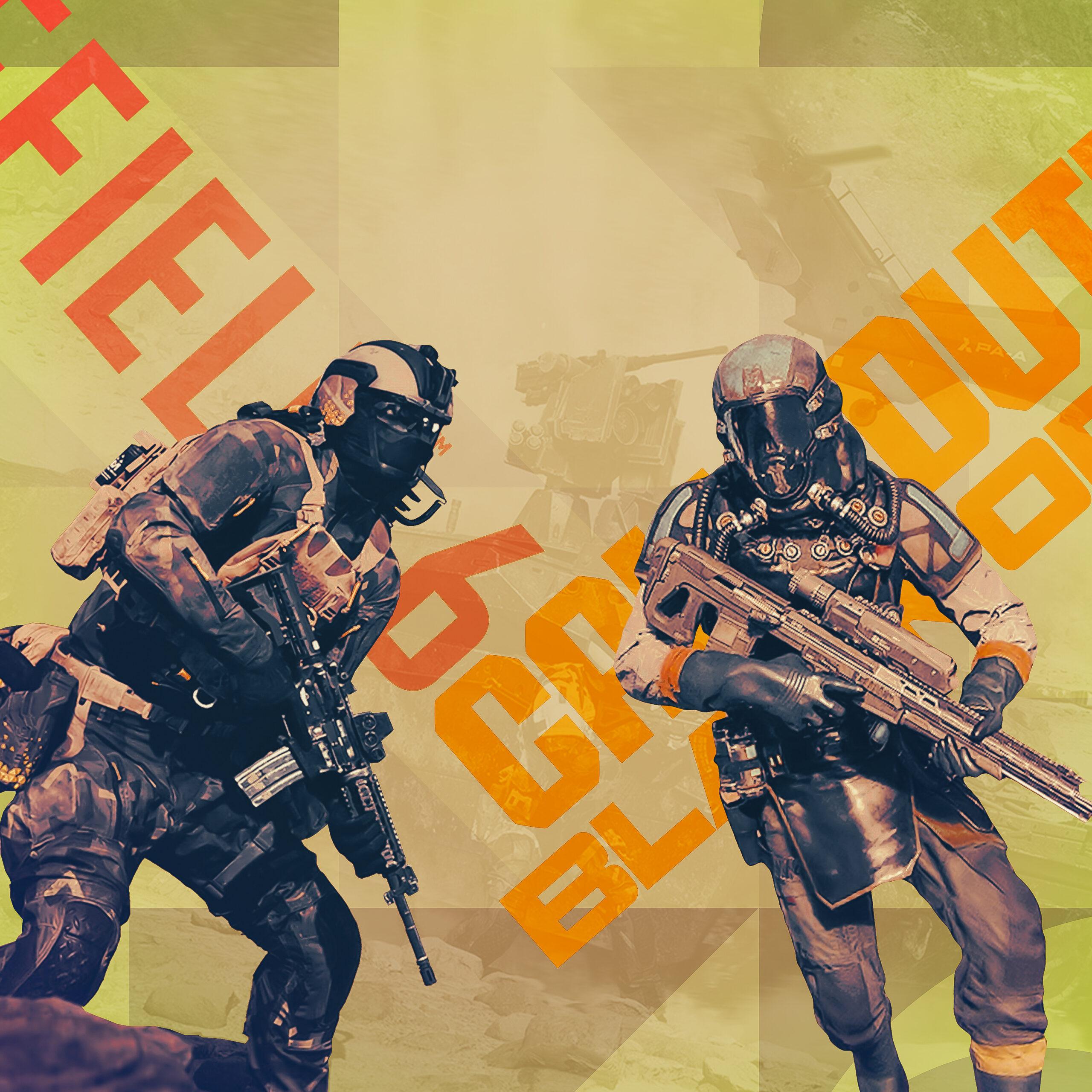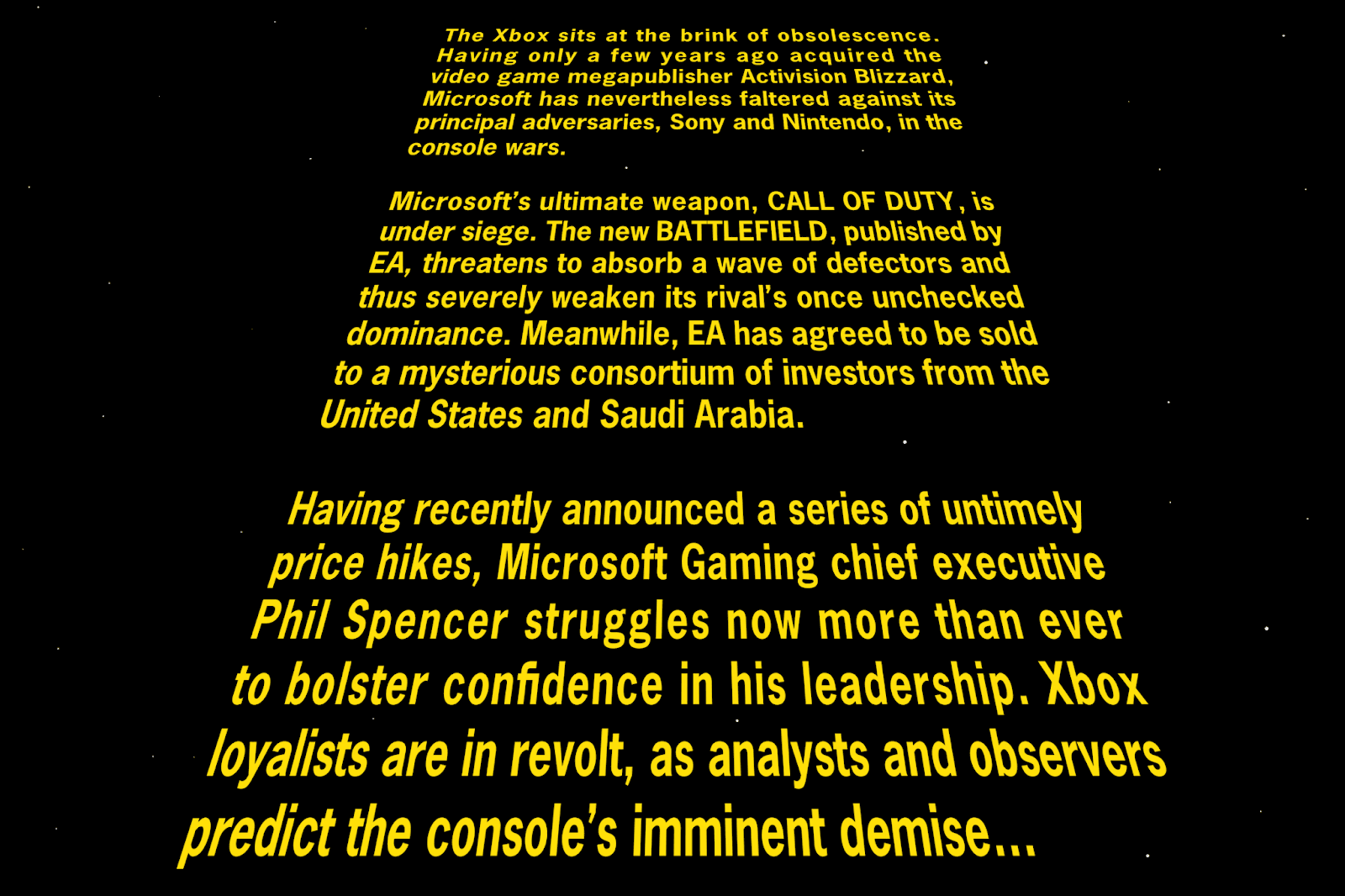Can ‘Battlefield 6’ Knock ‘Call of Duty’ Off Its Throne?
The latest ‘Battlefield’ is breaking launch records at a time when its biggest competitor—and, by extension, Microsoft—feels vulnerable
Every now and again, I’ll cover the competitive, multibillion-dollar saga of the major video game console publishers—Microsoft, Sony, and Nintendo—and each time, as I’m dutifully recapping the gambits that have played out, the controversies that have erupted, and the fortunes that have reversed in the time since I last filed, I’ll feel as if I’m writing an epic crawl à la Star Wars.
I might as well take a real stab at it here:

Tell me you wouldn’t watch that movie!
That’s a lot of story lines, though, and today I’m inclined to focus on the timeliest angle: EA’s Battlefield potentially succeeding Activision’s Call of Duty as the king of first-person shooters.
Three years ago, Call of Duty—the second-biggest competitive multiplayer video game in the world, after Fortnite—was widely seen as a linchpin of Microsoft’s deal to buy Activision. Everyone understandably assumed that Microsoft would turn the must-play, cross-platform shooter into an exclusive for the Xbox in order to drive sales of the Xbox (duh). If only the politics of the deal were so simple: Fierce scrutiny of the deal from Lina Khan’s FTC more or less forced Microsoft to offer 10-year agreements to Sony and Nintendo to keep releasing Call of Duty on those companies’ competing consoles, in order to assuage antitrust concerns. Nevertheless, Microsoft now owns COD, a commercial coup that would surely, in some form or fashion, herald a new dawn for the Xbox.
Unfortunately, Microsoft’s plans for world domination have, so far, at least, proved anticlimactic. The theory at the time was that Microsoft would use its precious new publishing power to churn out must-play games and thus bolster the value proposition of the Xbox as a must-own console. The reality so far: Microsoft has struggled to realize the early potential of the deal, as Spencer has seemingly forsaken exclusivity altogether and instead prioritized putting the company’s games on all the major platforms in order to reach the widest possible player base—a policy that has, rather predictably, weakened the specific value proposition of the Xbox. Furthermore, Microsoft seemingly self-sabotaged sales of Call of Duty on the Xbox by launching the most recent entry, Black Ops 6, as a “day-one” title on Xbox’s subscription service, Game Pass, effectively giving (rather than selling) the game to Ultimate-tier subscribers.
Now enter Battlefield, the first-person shooter that stands to gain the most from any ground lost by Call of Duty. In its open beta, Battlefield 6, which officially released on Friday, hit some auspicious milestones, reporting more than 20 million players across all platforms and surpassing COD’s all-time peak concurrent player count on Steam. In its full release this past weekend, Battlefield 6 peaked at more than 700,000 concurrent players on Steam and quickly became EA’s all-time biggest launch on Steam (surpassing Apex Legends).
As franchises, Battlefield and Call of Duty bear different signatures and strengths. Battlefield is grand and atmospheric, with vast maps, long matches, pseudo-realistic gunplay, vehicular combat, and, overall, a more grounded style. Battlefield is a long-running franchise and a popular one, for sure, but it’s got a fraction of the player base of its biggest competitor. Call of Duty, on the other hand, is tight and twitchy, with smaller maps, quicker engagements, shorter matches, and, these days, a splashier style; the recent run of crossover cosmetics—Nicki Minaj in Modern Warfare III, American Dad in Black Ops 6—has turned this once rugged franchise into something more resembling Fortnite. Call of Duty is also, relatedly, full of microtransactions, perhaps the most persistent source of frustration with the franchise.
Crucially, Call of Duty drops annually, with individual titles generating more than a billion dollars in revenue in their respective release years. The franchise is unmatched in sheer dependability. Call of Duty isn’t merely dominant; it has consistently been the first-person shooter to beat for nearly two decades.
Electronic Arts—soon to be under new ownership—now seems determined to challenge that dominance, right as Microsoft and Activision seem least prepared to sustain it. In the long term, EA reportedly plans to dedicate three studios to producing Battlefield on a rotating basis, similar to the system Activision once used to hit its yearly release targets for Call of Duty. In the near term, EA is pitching Battlefield 6 as a self-respecting shooter with a modern setting and a style not so dissimilar to Modern Warfare’s—in other words, a game that’s equipped to welcome the throngs of defectors who are disillusioned with the colorfully junky state of Call of Duty.
EA is also making an implicit pitch to Microsoft’s competitors. Spencer may have grudgingly signed those 10-year agreements with Sony and Nintendo, but the state of cross-platform COD in year 11 is decidedly uncertain, so this year Sony seems to be marketing the PlayStation—still the most popular platform for playing Call of Duty, mind you—as Team Battlefield.
Battlefield 6 has a month to make its pitch for world domination, ahead of the release of Black Ops 7 in November. Any lasting decline of Call of Duty is still a far-off prospect, and even the immediate matchup between Black Ops 7 and Battlefield 6 is hardly a settled score. Battlefield 6 could still botch its big moment with missteps of its own. (Early responses to the game’s single-player campaign mode, for instance, are decidedly negative.) Black Ops 7 might ultimately beat the bad vibes around the wider franchise and reclaim some goodwill for Call of Duty. (The early buzz for Black Ops 7, out of the open beta, is moderately optimistic.) Meanwhile, the new owners of EA may well scrap the old vision—or, worse yet, compromise the identity—of Battlefield in their own ways. So many more gambits must play out, so many more controversies must erupt, and so many more fortunes must reverse before Call of Duty goes the way of Halo and Microsoft Gaming goes the way of Sega, sending me into a new document to script yet another epic crawl.



